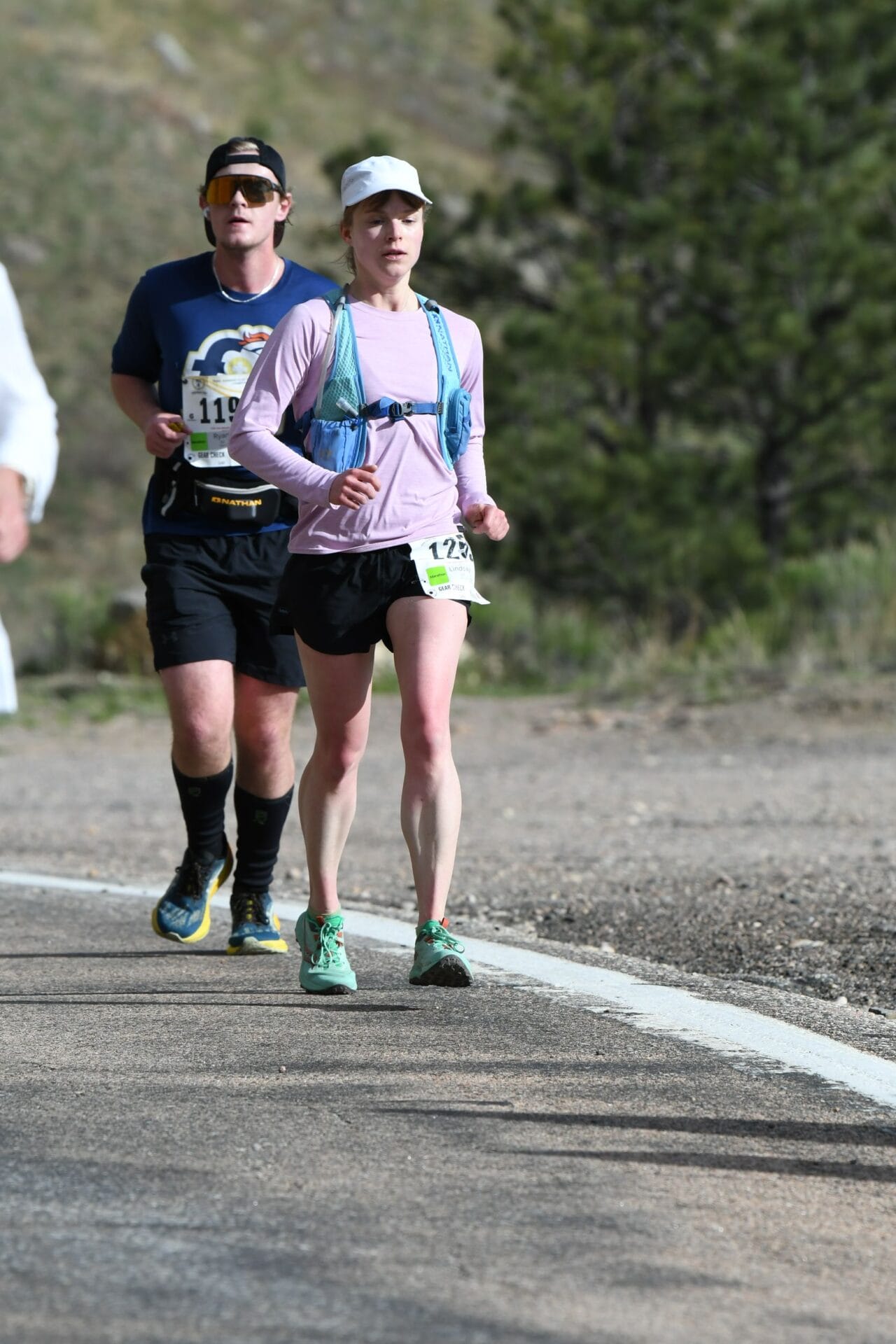
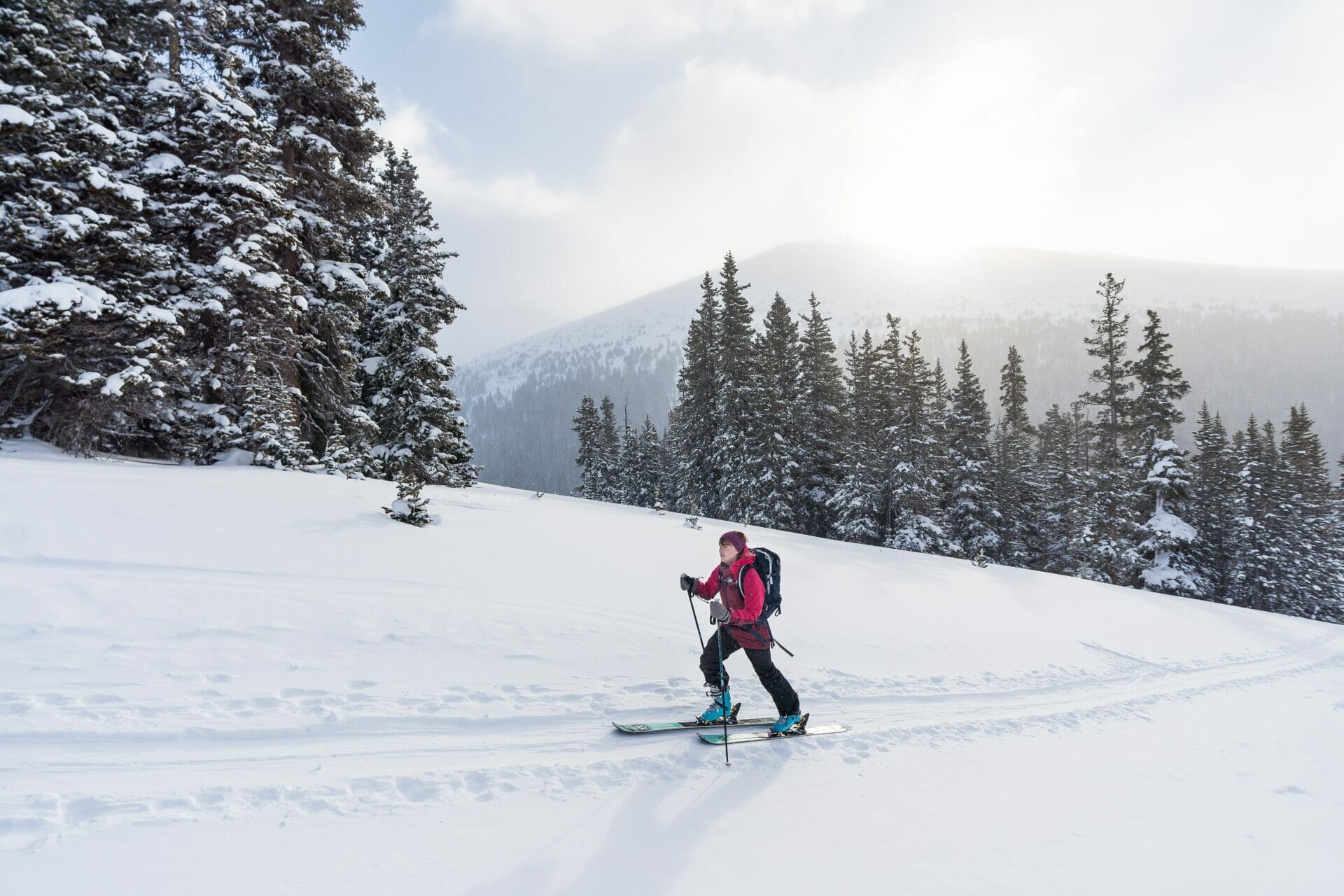
There are few sports more exhilarating than skiing! I’ve been skiing since I was 8 years old, and my love for and enjoyment of the sport only continues to grow by the year!
Whether you’re an alpine or backcountry skier, skiing is demanding on your body. Nourishing your body with the right foods can make all the difference between enjoying a long, fulfilling ski day and calling it quits early due to muscular fatigue (with alpine skiing) or bonking (with backcountry skiing).
In this article, I’ll provide the ultimate skier’s diet guide. I will discuss the physiological demands of skiing and how this ties into your nutrition. I’ll explain how to nourish your body optimally before skiing, hydrate and refuel during your ski adventure, special considerations for alpine nutrition, and supplements that may aid your skiing performance and recovery. Let’s dive in!
Please note that I am an affiliate for some of the products I’ve linked to in this post. If you click the link here and make a purchase, I may earn a commission at no extra cost to you.
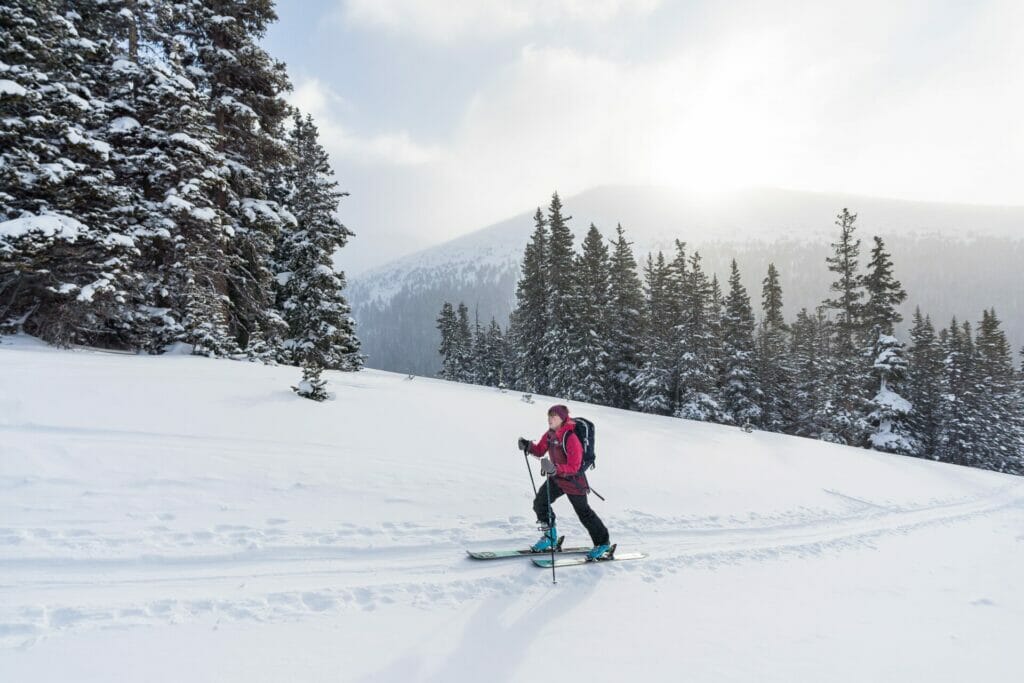
As a human physiology nerd, I’d like to set the stage by discussing the energy systems that your body uses when skiing. This will help you better understand the “why” behind the skiing nutrition recommendations I make in this article.
Please note that I will discuss alpine (downhill) skiing and backcountry skiing, which takes place in unmarked or unpatrolled areas either inside or outside a ski resort’s boundaries. I may discuss nutrition for Nordic/cross-country skiing in a future blog.
Downhill skiing is, in essence, a form of interval training. You engage in relatively short bursts of intense activity as you ski down runs and then rest between runs while going back up the mountain on a chair lift. Aerobic and anaerobic energy systems fuel downhill skiing; however, compared to backcountry skiing, downhill skiing is more anaerobic because your heart rate has time to come down between runs. (Source)
Conversely, backcountry skiing is more aerobic than alpine skiing because you travel up the slopes under your own power by skinning and then skiing down. Heart rate tends to be elevated throughout a backcountry ski outing, with fewer opportunities for rest, making it more of a continuous aerobic effort than an interval effort.
The body’s aerobic energy system is fueled by glucose, fat, and, to a small extent, protein. The body’s anaerobic system is fueled by glucose. The alpine skier will thus rely heavily on carbohydrates to fuel their activity, while the backcountry skier should ideally use a blend of fat (from body fat and, to a lesser extent, your diet) and glucose for fuel, and perhaps a small amount of protein too.
During skiing, glucose will primarily be supplied by the carbohydrates you consume in your diet before and during skiing and by glycogen, the stored form of glucose in your liver and muscles.
Both alpine and backcountry skiing require strength and power, which are fueled, for the most part, by carbohydrates.
If an alpine skier fails to fuel properly before and during a ski day, he may struggle with prematurely fatigued legs and impaired neuromuscular control while skiing.
If a backcountry skier fails to fuel properly before and during skiing or is over-reliant on carbohydrates for fuel and cannot efficiently use fat for energy, he may “hit the wall” or “bonk” while skinning. Improper fueling may also compromise strength and coordination while skiing and potentially impair decision-making, which can become dangerous, especially in the backcountry!
In short, proper nutrition is vital for both alpine and backcountry skiers.
Please note that I cover nutrition foundations for recreational (including high-level recreational) alpine and backcountry skiers in this blog, NOT elite athletes. The nutritional needs of elite skiers will differ in certain regards from the guidelines I provide here.
Let’s begin by discussing the foundations of a healthy, nourishing diet for skiers because what you eat daily, not just what you eat the day of a ski outing, has an enormous impact on your skiing performance and recovery.
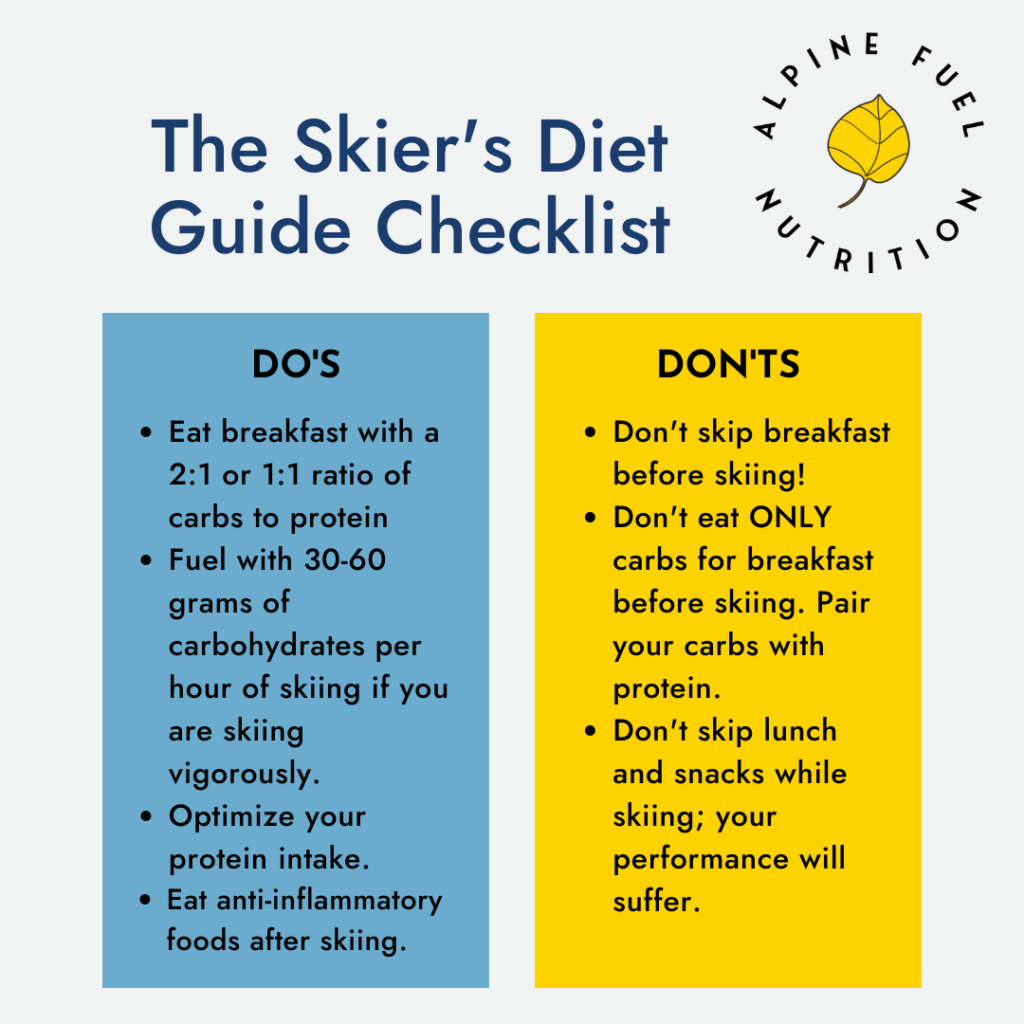
Carbohydrates and fats are the primary substrates that your body uses as fuel during daily life and while skiing. While protein isn’t a significant energy source in the body, it serves many other vital functions; it is a component of every cell and tissue in your body, allows you to build and repair muscle, and supports your connective tissues. Protein, carbohydrates, and fats are the “macronutrients” that compose our diets.
Eating a healthy balance of protein, carbohydrates, and fats in your diet will help you regulate your blood sugar and energy levels, perform well during exercise, and recover quickly.
Many skiers who are at a healthy weight and have a moderate to high physical activity level do well with a protein intake range of 1.4-2.0 g/kg body weight.
For example, a 120-lb woman who is a recreational skier and at a healthy weight may aim for a protein intake somewhere in the range of 76-109 grams of protein/day. This is a large range, and that is by design; various factors, such as the total amount of physical activity the woman engages in, the amount of muscle mass she has on her body, her age, and the amount of protein she must eat to feel satiated, all impact where her ideal protein intake will lie.
For reference:
The type of protein you eat as a skier also matters. It is crucial that you choose proteins rich in the amino acid leucine to support muscle repair after skiing because leucine is vital for muscle protein synthesis. (Source)
However, leucine isn’t equally prevalent in all proteins. Animal proteins such as red meat, poultry, seafood, and whey protein are rich in leucine, whereas plant proteins are much lower in this crucial amino acid. While you could supplement with leucine on a plant-based diet to round out your amino acid intake, I strongly encourage eating a whole-food omnivorous diet that naturally supplies leucine. (Source)
I have found that many recreational skiers do well with a baseline carbohydrate intake of 100-150 grams/day during ski season if they are skiing a couple of times a week on average and exercise moderately outside of skiing. Please note that a skier’s carbohydrate needs may change outside the ski season.
High-level recreational skiers, especially backcountry skiers, may need 150 or more grams of carbohydrates per day during ski season if they are skiing regularly and training throughout the week.
** Please note that this recommendation is simply a starting point for determining an appropriate carbohydrate intake for a skier. Carbohydrate needs vary based on an individual’s age, body weight, sex, total training/physical activity load, body composition goals, and health goals.
You should also refuel with additional carbohydrates on top of your baseline carbohydrate intake while skiing. For example, backcountry skiers on the move for more than 2 hours should consider refueling with 30-60 grams of carbohydrates per hour, ideally from whole foods like bananas, trail mix, or possibly a whole-food energy gel like Muir Energy.
Ideally, the majority of your dietary carbohydrates should come from whole foods. Whole-food carbohydrates, or carbohydrate-containing foods that have been minimally processed should comprise most of your carbohydrate intake as a mountain biker. Whole-food carbohydrates include sweet potatoes, white potatoes, root vegetables, legumes, and whole grains such as quinoa and steel-cut oats.
Whole-food carbohydrates produce a gentle rise in blood sugar, promoting stable, sustainable energy. This is valuable when you are skiing for hours and need a consistent energy source!
Conversely, refined carbohydrates are carbohydrates that have gone through a manufacturing process. This manufacturing process may turn the carbs into flour and flour-based foods like pasta, bread, and crackers. Refined carbs also include sugars, such as table sugar.
Refined carbohydrates are rapidly digested in the small intestine. Once these rapidly-digested carbs are absorbed, they can initially spike your blood sugar and then cause a precipitous drop in blood sugar; this dramatic fluctuation can negatively impact your energy, focus, and cognition, which is a big problem in your daily life and while skiing!
Whole-food carbohydrates also contain fiber, vitamins, minerals, and antioxidants. These compounds support multiple aspects of your health that influence athletic performance and recovery, including gut health, cellular energy production, and exercise recovery.
Examples of whole-food carbohydrates include:
While there’s a time and place to enjoy refined carbohydrates, such as after a long day of ski touring, it is best to prioritize whole-food carbohydrates the majority of the time if your goal is to experience stable energy, mental clarity, and long-term health.
Here are some examples of whole-food carbohydrates and the amount of carbohydrates provided per serving of each food:
Once your protein and carbohydrate needs are dialed in, fat will make up the balance of your caloric intake.
Your daily fat intake should consist of healthy, anti-inflammatory fats. Healthy fats help regulate inflammation (which can be exacerbated by strenuous exercise) and hormone production and support satiety. Examples of healthy fats include:
Conversely, we want to avoid inflammatory fats, namely industrial seed oils. Industrial seed oils (often referred to as “vegetable oils”) are the oils expressed from oilseeds, including canola (rapeseed), corn, cottonseed, grapeseed, safflower, soybean, and sunflower oils.
Industrial seed oils are recent additions to the human diet (we only began consuming them in significant amounts in the 20th century), and research suggests that consuming these oils drives inflammation and, possibly, chronic diseases like cardiovascular disease. (Source)
Disclaimer: The protein, carbohydrate, and fat intake suggestions I’ve provided here are just a starting point. Calorie and macronutrient needs can differ significantly from one skier to the next.
If you need help personalizing your nutrition plan so you can perform your best as a skier and feel and function optimally in your daily life, consider partnering with a sports nutritionist who can create a nutrition plan suited to your unique needs.
Before heading out for a long, fulfilling day on the slopes or in the backcountry, I highly recommend eating a balanced breakfast.
Aim for a 2:1 or 1:1 ratio of carbohydrates to protein at breakfast.
To achieve this ratio, you can either familiarize yourself with how many grams of carbs and protein are in foods you commonly eat or use your hands to approximate. For example, you’ll want to eat one hand-sized serving of a carbohydrate, such as hashbrown potatoes or oatmeal, and a hand-sized serving of protein, such as scrambled eggs or fried eggs and sausage.
The ratio of 2:1 or 1:1 is important because it will help you maintain stable energy levels rather than experiencing a sudden blood sugar rush followed by a crash (from eating too many carbohydrates and not enough protein).
Other ideas for a balanced breakfast include:
Skiing, whether alpine or backcountry, usually occurs over several hours. You’ll want to eat something during your ski outing to keep your energy level up. I highly recommend bringing your own snacks that provide a balance of carbohydrates, protein, and fat; if you’re alpine skiing, toting your own snacks will help you avoid paying for overpriced processed food in the slopeside restaurants. If you’re a backcountry skier, bringing your own food is necessary – there are no vending machines in the backcountry!
Here are some ideas for snacks that will support stable energy levels and (for the snacks that contain protein) minimize muscle damage while skiing:
Avoid excessively sugary snacks, such as candy. While occasionally enjoying candy is fine, it is not great for supporting your energy and endurance while skiing due to its propensity to cause blood sugar spikes that can eventually result in a blood sugar crash, fatigue, sluggishness, and brain fog. The high sugar concentration can also be tough on the gut for some people.
Most skiers don’t need to fuel with gels, Bloks, and other sugary sports nutrition products. The exception would be if they are competing or are out for many hours in the backcountry and need additional carbohydrates that will be digested and absorbed rapidly.
I recommend trying a whole-food-based sports nutrition product such as Muir Energy or Spring Energy because these products may be better for blood sugar and gut health (and provide more nutritional value) than conventional processed sugar-based sports nutrition products.
If you’re out skiing all day, you will want to eat lunch and not JUST snacks. Eating a balanced lunch can prevent mid-afternoon fatigue and help you enjoy your ski day to the fullest!
I recommend combining protein, a whole-food carbohydrate, and a vegetable to make your balanced ski day lunch. Sandwiches and wraps provide the perfect balance of protein, carbs, and vegetables. I prefer sourdough bread (gluten-free, in my case, since I’m gluten-sensitive) with high-quality deli meat like Applegate turkey slices, lettuce, avocado, tomato, and mustard.
Be cognizant of your portions at lunch. While you absolutely need to eat enough to stay fueled, it’s also important not to overeat (this is more likely to occur if you stop by the slopeside cafeteria for lunch during alpine skiing) because overeating can cause sluggishness and make it hard to return to skiing.
If you are skiing at a resort and decide to eat at one of the slopeside cafeterias or restaurants, be thoughtful about your food choices there.
Many slopeside cafeterias and restaurants serve carb and fat-heavy foods that may make you sleepy, sluggish, and less motivated to ski in the afternoon! I recommend bringing your own lunch instead; you’ll feel more energized for an afternoon of skiing and save some money!
What you eat after skiing is as important as what you eat before and while skiing! Post-ski nutrition supports muscle recovery, allowing muscles to repair overnight so you can go out and ski again the following day! Try to eat a balanced meal within an hour of finishing skiing.
It is crucial to ensure you eat plenty of protein in your post-ski meal. The amino acids in protein are used to repair damaged muscle tissue and support beneficial training adaptations.
Eating sufficient carbohydrates after skiing will help you replenish your glycogen stores. Furthermore, research shows that pairing carbohydrates with protein in a post-exercise meal is more effective at replenishing glycogen than consuming carbohydrates alone.
Combining carbohydrate and protein intake may be more effective for replenishing glycogen because leucine, the muscle-building amino acid I discussed earlier, can promote insulin release.
Insulin is a hormone your pancreas makes that helps your tissues take up glucose, including liver and muscle tissues. Combining carbohydrates and protein may also stimulate glycogen synthase, a critical enzyme involved in glycogen formation. (Source, Source)
An excellent post-ski recovery meal would be a stir-fry with ample protein, vegetables, and white rice. Steak, sauteed veggies, and a baked potato would also be an excellent choice!
I also recommend incorporating anti-inflammatory foods into your post-ski meal. While inflammation is a normal and desired short-term response to exercise, chronic inflammation can impair exercise recovery and subsequent exercise performance.
While taking an isolated antioxidant supplement may impair training adaptations, eating anti-inflammatory foods doesn’t cause the same problem and may, in fact, have positive effects on exercise recovery.
Foods with anti-inflammatory properties that may support exercise recovery include fruits like berries, leafy greens like spinach, and omega-3-rich seafood. (Source, Source, Source)
I know it is commonplace to consume alcohol after alpine skiing (apres-ski is a massive industry in ski towns!). I also see many backcountry skiers bring alcoholic beverages to drink after a long day in the backcountry.
Just as with refined carbohydrates and processed sports nutrition products, it is acceptable to consume alcohol in moderation. However, it is also important to recognize that alcohol will NOT support exercise recovery or performance in any way.
Studies show that alcohol ingestion increases dehydration, impairs muscle recovery, and even increases the risk of injuries. (Source)
Furthermore, alcohol can take a toll on people at altitude. Some people are more sensitive to alcohol at altitude and may suffer from worse hangovers and physical repercussions (such as muscle stiffness and soreness) the day after imbibing.
I recommend calibrating your alcohol intake to suit your skiing goals: If you want to ski recreationally and just have fun (and aren’t struggling with altitude illness), feel free to enjoy alcohol in moderation apres-ski. If you aim to achieve a backcountry skiing objective or to feel and perform your absolute best, skip the alcohol.
Exercising in alpine conditions, such as those we’re exposed to when skiing, poses some unique challenges.
For one, high altitude exposure can increase metabolism and decrease appetite, making it difficult for some skiers to meet their nutritional needs. It is important to be aware of these potential effects of altitude so you can be diligent about feeding yourself even when your body’s hunger signals are dampened. (Source)
If you are the type of person who forgets to eat, set an alarm with a gentle ringtone on your phone to remind yourself when it is time to refuel.
Research also shows that the body preferentially burns more carbohydrates at altitude. This is why you may need to increase your carbohydrate intake above your baseline carb intake when skiing and why you need to refuel with carbohydrates during your ski outings.
Finally, cold exposure while skiing can also take a toll on the body. Of course, dress appropriately and call it quits if you show signs of hypothermia or frostbite. Eating warm, hearty meals and bringing a warm beverage, such as herbal tea, in a thermos with you while skiing can also do wonders to boost morale while you’re skiing.
Dehydration resulting in losing 2-3% of body mass may impair endurance performance, such as skiing. (Source)
Here are some guidelines for estimating your fluid needs while skiing:
It is also important to consume electrolytes when skiing, especially if you are adjusting to higher altitude than normal or are backcountry skiing, provided you don’t suffer from a health condition or take medications that preclude using supplemental electrolytes. I often recommend a low-osmolality electrolyte mix such as Skratch Labs Hydration Sports Drink Mix.
Bring an insulated hydration bladder that you can pop in your backpack to sip on water throughout your ski day.
Specific supplements may be helpful to skiers. However, it is crucial to be judicious about selecting supplements and to ALWAYS consult with your healthcare provider before trying any supplements.
One supplement that may be beneficial for skiers is creatine. Creatine is an amino acid primarily located in the body’s muscles. However, some creatine can also be found in the brain. Creatine plays a central role in the body’s phosphocreatine system, where it is used to create cellular energy or ATP.
Numerous studies have shown supplemental creatine improves strength, power, anaerobic, and endurance exercise performance. These effects of creatine may make it a valuable supplement for skiers seeking to perform their best. (Source, Source)
Vitamin D is another supplement that may be beneficial for skiers. Your body makes vitamin D via UVB light exposure from the sun; you may also consume small amounts of this nutrient in your diet through foods such as fatty fish.
However, most people fail to maintain an optimal vitamin D level solely through sun exposure and dietary intake, especially during the fall and winter at latitudes above 37 degrees north and 37 degrees south of the equator.
Vitamin D is vital for muscle function, cardiovascular function, bone density, and inflammation regulation, making it critical for athletes. An insufficiency or deficiency of vitamin D may compromise your skiing performance and long-term health. (Source, Source)
An optimal range for vitamin D is 40-60 ng/mL. Ask your doctor or sports nutritionist to measure your vitamin D level at least twice a year to ensure you stay in this range. If your vitamin D level is below 40 ng/mL, work with your healthcare provider to determine an appropriate vitamin D supplementation strategy.
Finally, supplements are NOT a replacement for a wholesome diet. Dialing in your diet first is key; supplements should only be added once your nutrition plan is optimized.
Skiing is a physically demanding sport that can take us into extreme environments. Fueling your body properly with nourishing food is essential for performing your best on the slopes and enjoying your ski adventures to the fullest!
Keep in mind that nutrition is highly individualized. The recommendations I’ve provided in this article provide a solid foundation for beginning to optimize your diet for skiing. However, if you need one-on-one, personalized nutrition guidance, consider working with me in my nutrition practice! I am currently accepting new mountain athlete clients and would love to help you!
Would you like a super convenient, easy-to-read, PDF version of this comprehensive blog? Grab your PDF copy of The Ultimate Skier’s Diet Guide for Peak Nutrition on the Slopes!
The content provided on this nutrition blog is intended for informational and educational purposes only. It is not a substitute for professional medical advice, diagnosis, or treatment. Always seek the advice of your physician or other qualified health provider with any questions you may have regarding a medical condition. Never disregard professional medical advice or delay in seeking it because of something you have read on this blog.
The information and recommendations presented here are based on general nutrition principles and may not be suitable for everyone. Individual dietary needs and health concerns vary, and what works for one person may not be appropriate for another.
I make every effort to provide accurate and up-to-date information, but the field of nutrition is constantly evolving, and new research may impact dietary recommendations. Therefore, I cannot guarantee the accuracy or completeness of the information presented on this blog.
If you have specific dietary or health concerns, please consult a qualified nutritionist or another healthcare professional for personalized guidance.
I empower others through nutrition to conquer their mountain adventures, drawing from my own experiences.
With a background in Biomedical Science and an M.S. in Human Nutrition, I’m a Certified Nutrition Specialist and Licensed Dietitian Nutritionist. My journey in functional medicine has equipped me to work alongside athletes and tackle complex health cases. As a passionate trail runner, backcountry skier, and backpacker, I strive to support others on their paths to peak performance and well-being.


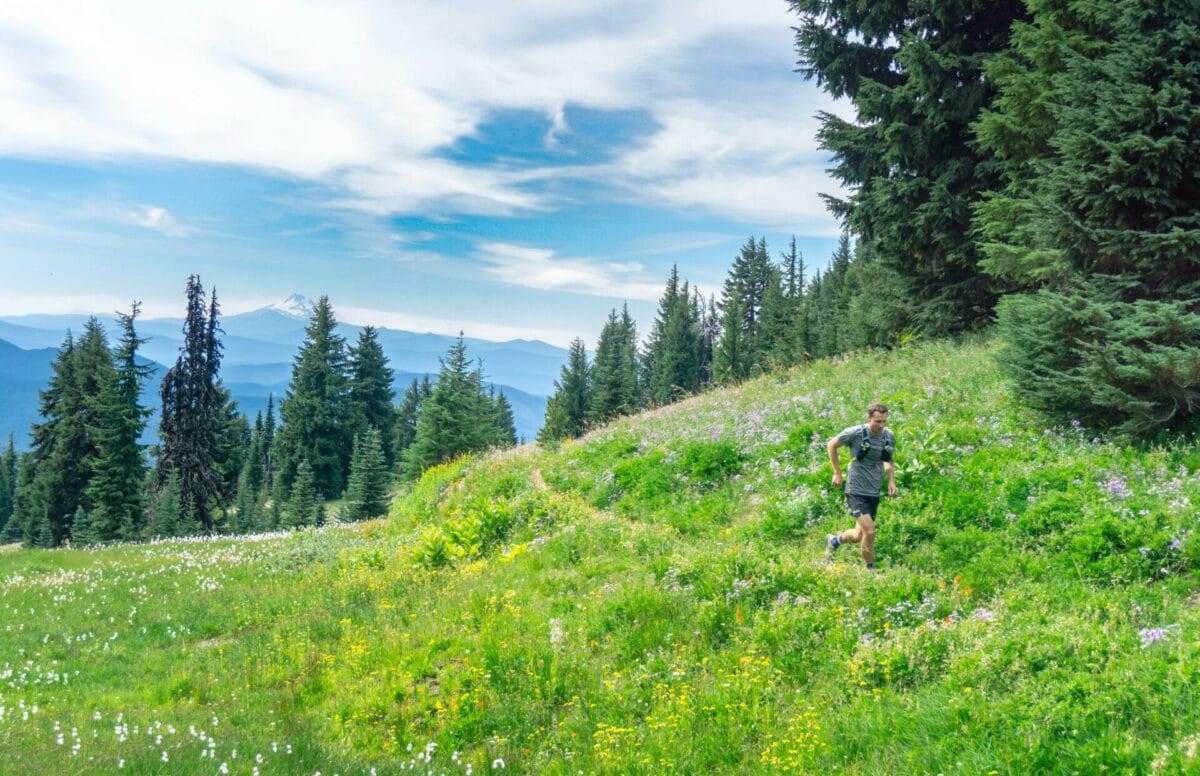
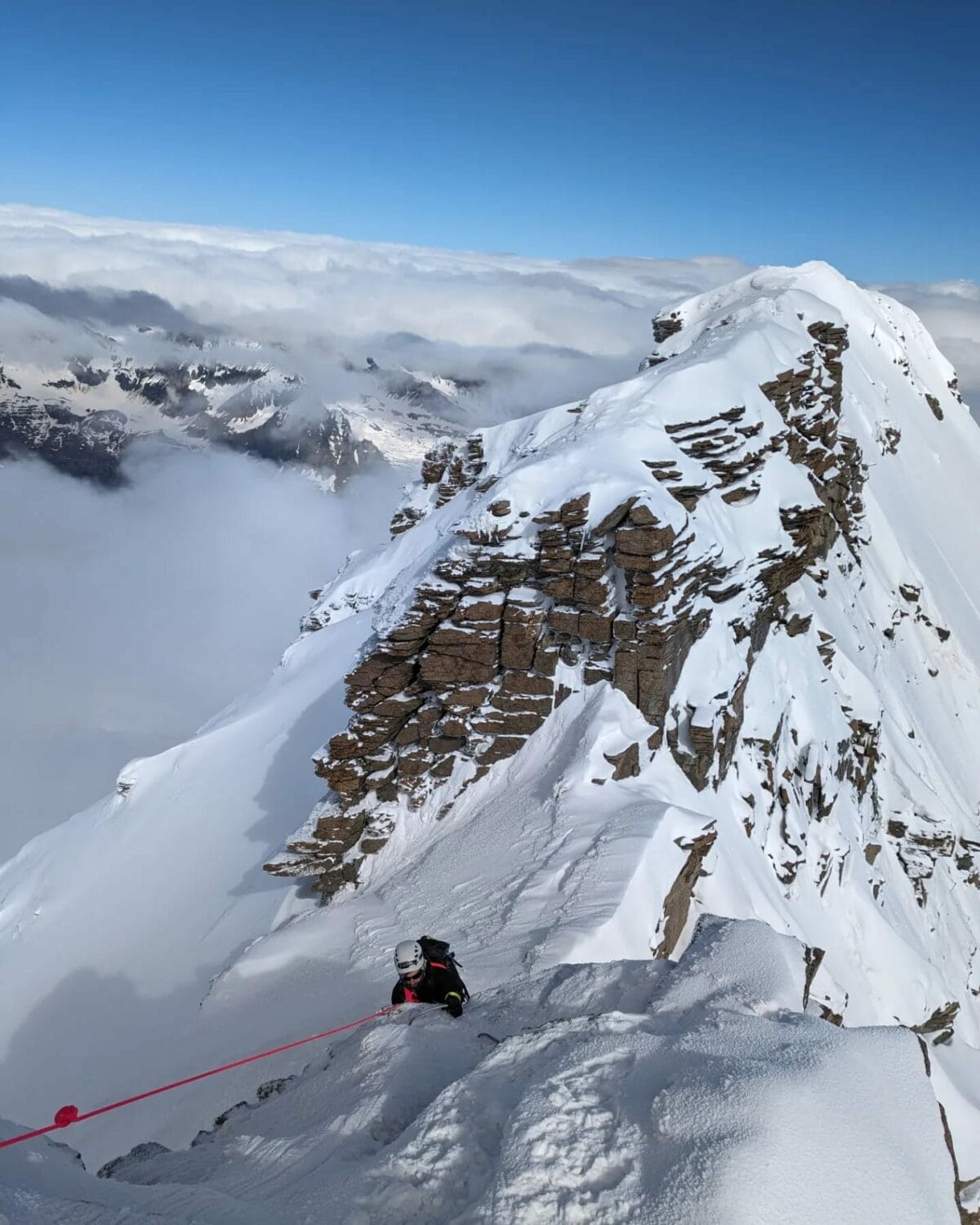
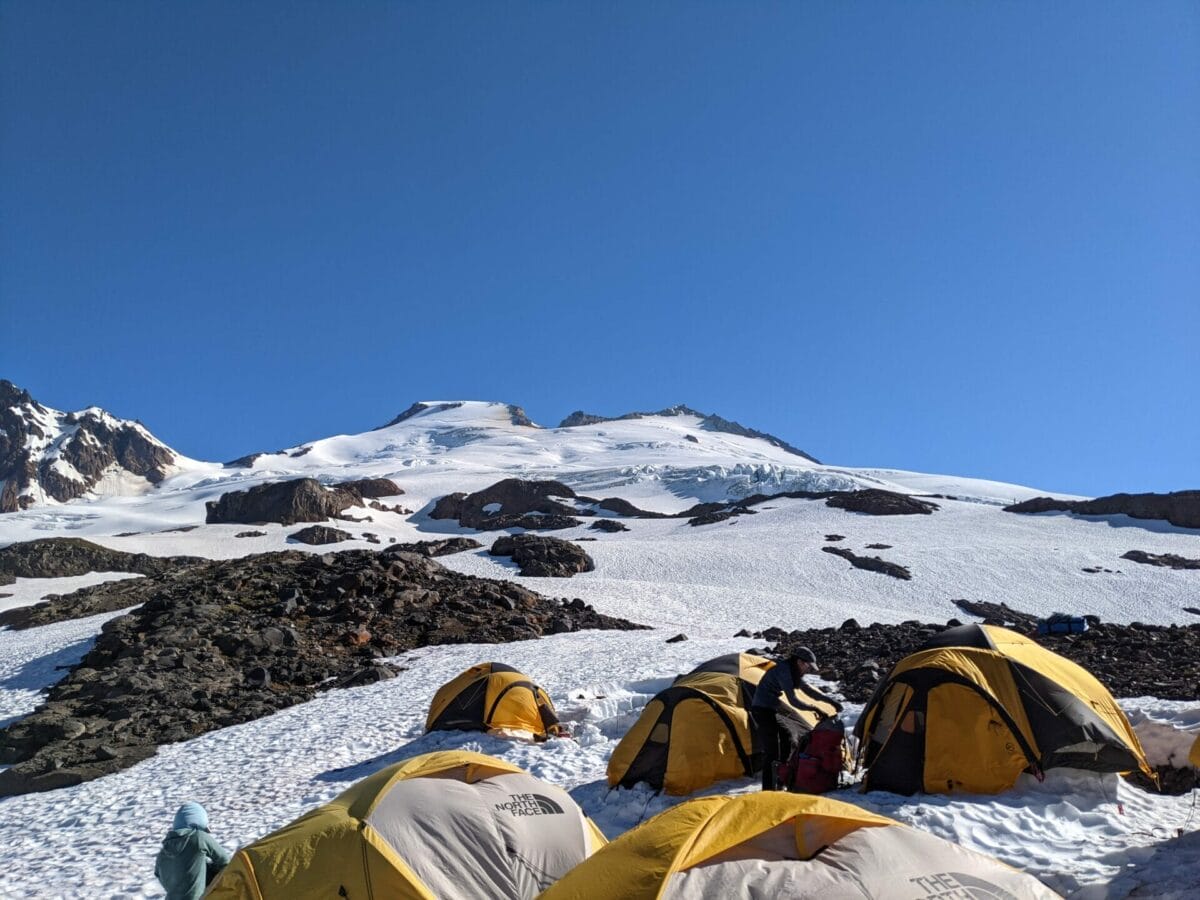
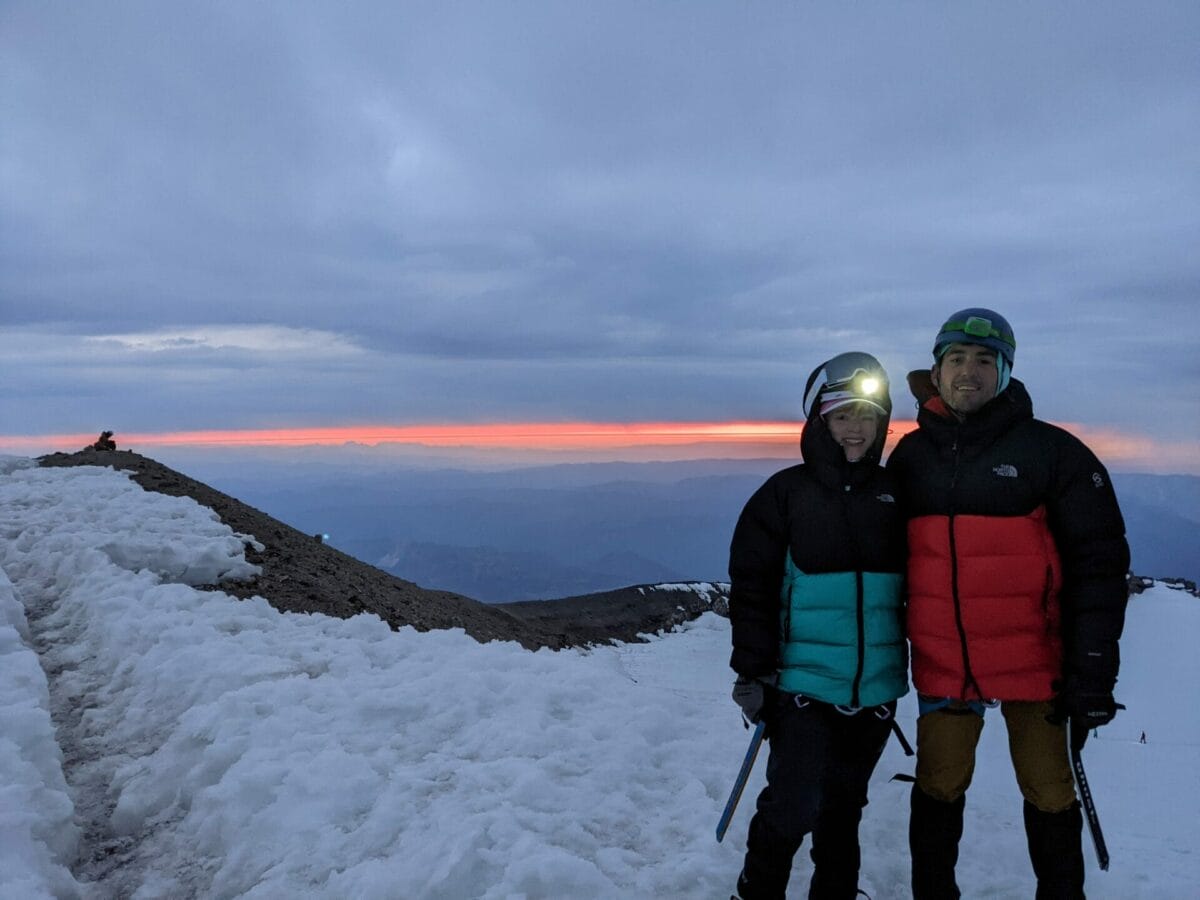
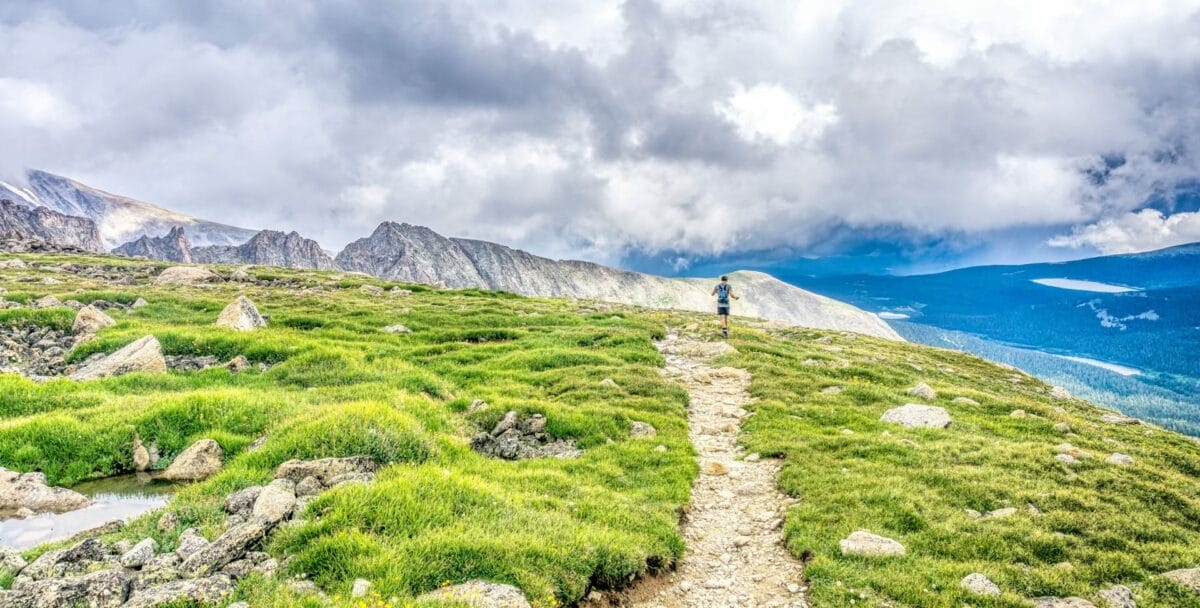
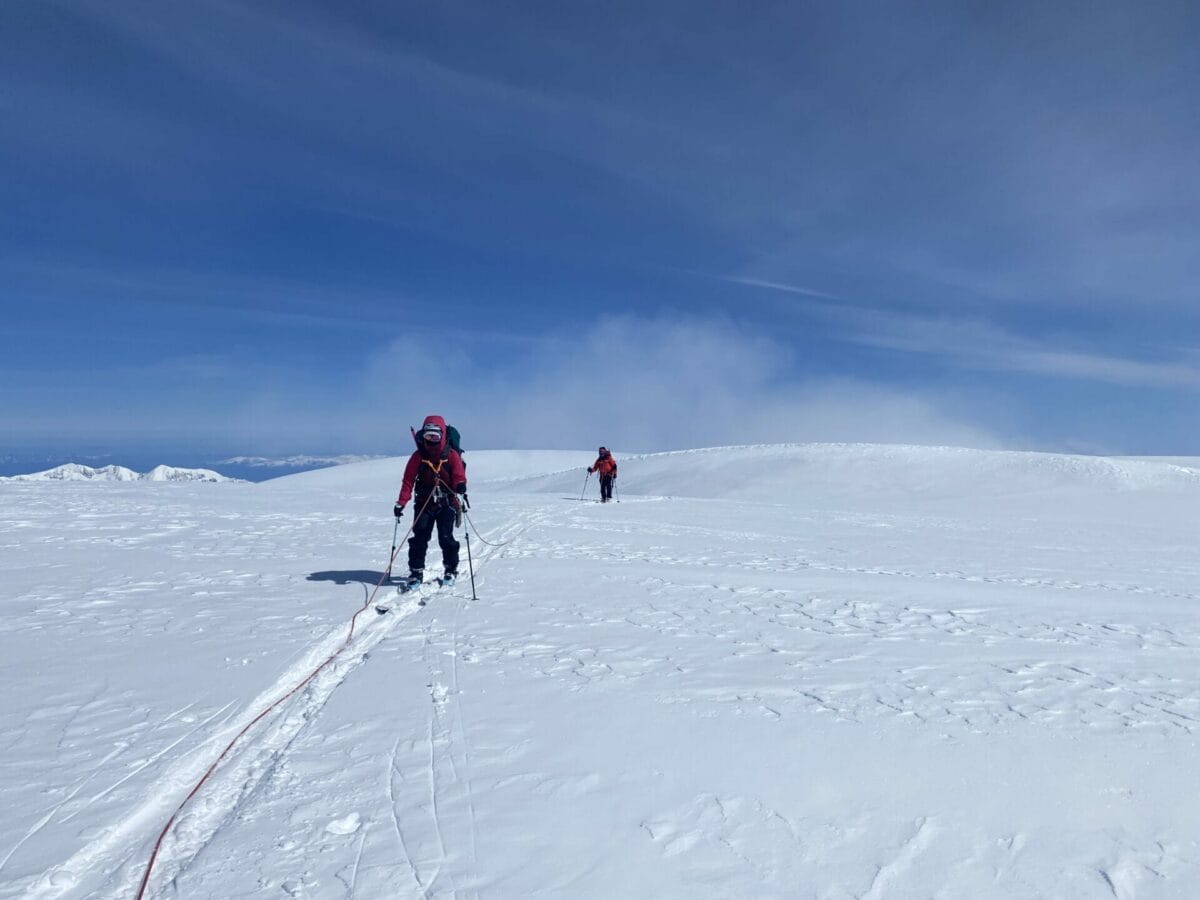

Sign up for updates that come right to your inbox.